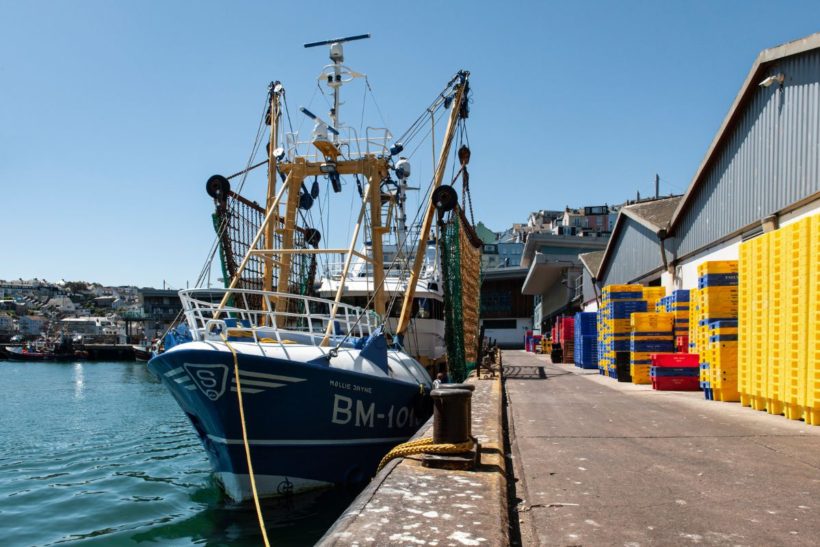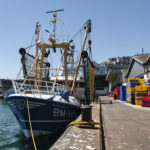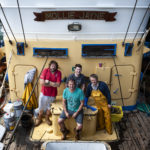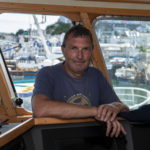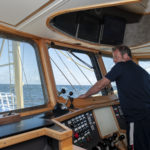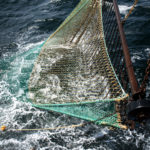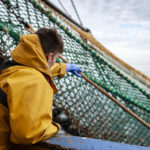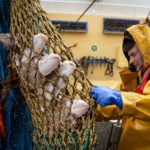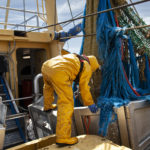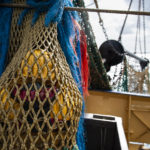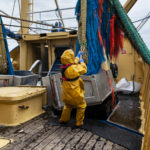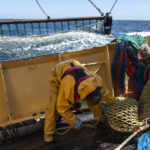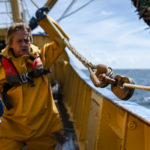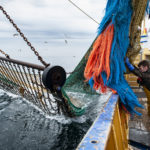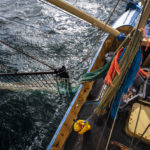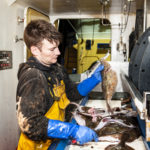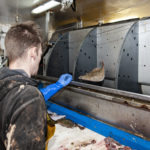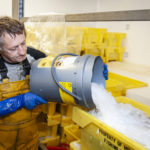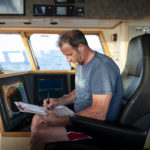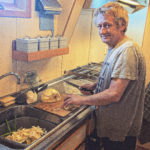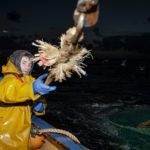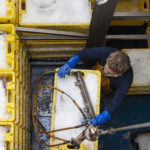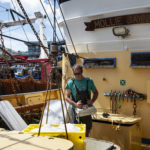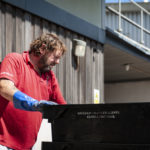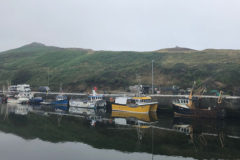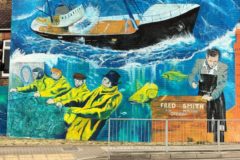Photojournalist Tony Fitzsimmons documents observations and conversations from an early-summer trip onboard the SWFPO beam trawler Mollie Jayne
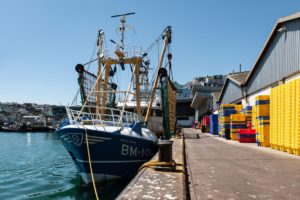
The Mollie Jayne prepares to leave Brixham for an eight-day trip under a clear blue sky.
The South Western Fish Producers’ Organisation (SWFPO), under its new CEO Juliette Hatchman, who took over when Jim Portus retired last autumn, is launching a new website later this year – hence my latest commission: to document trips across a number of different vessels and fishing methods to showcase the PO’s wide ranging membership.
The SWFPO currently has 48 vessels in membership, based all around the UK, not just in the South West as its name might suggest, with vessels ranging from 10m to 40m across a variety of types, from beam trawlers and scallop dredgers to whelk potters and netters.
First up was a trip on the Mollie Jayne BM 1010, one of the three Brixham beamers owned by former skipper Mike Sharp – the others being the Emilia Jayne and the Emily Rose. All had been named by his wife Claire, Mike told me: the Emilia after their first daughter, the Emily after their second, and the Mollie after their granddaughter
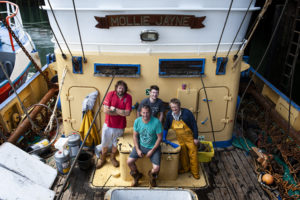
The hardworking four-man Mollie Jayne team, left to right: mate Taff, skipper Neil, and deckhands Jay Jay and Roger.
“The cost of fuel was a constant theme throughout the trip, with Neil and Taff working to make fishing operations as cost effective as possible”
“I’ve always been a member of the SWFPO,” Mike said proudly. “Ever since I started owning boats, I think, so it’s probably 30 years. If you are in the non-sector, which is the government’s quota, they issue a monthly target – whereas I have my yearly amount, so I can manage it better and fish it better, and it allows you to swap fish with other PO members or other POs – so it gives you a lot more freedom.”
Whilst quota management and facilitating swaps is an important element of the work of the SWFPO, there is much more to this organisation, representing members’ interests at the very highest level and proactively managing their reputations and that of the wider industry. Run for and by its members, it is led by an elected committee drawn from its membership.
As a mutual benefit society, any money generated goes straight back into the organisation to fund future activities and to help meet objectives agreed by the members – for example, to fund collaborative research projects on sustainable fisheries.
The Mollie Jayne was built in Holland in 2003, and previously fished under the name Adriana Maria. She still rivals many newer beamers in terms of the various mod-cons onboard.
She is powered by a Mitsubishi S6RF300 main engine, which was comprehensively overhauled last July, driving a fixed-pitch 2,500mm propellor through a Reintjes WAF 790P gearbox of 14.0784:1 reduction. Two Mitsubishi 6D22T auxiliaries of 221kW at 1,430rmp and 168kW at 1,500rmp are also fitted.
Mike purchased the Mollie Jayne towards the end of 2021, though it wasn’t until May this year that she began fishing out of Brixham. “There have been nice increases in the quota since the 50/50 project, when most of the boats started fishing with 100mm codends on our coast here. The small undersized sole are going through the net and out – so you are catching a better quality of fish.
“So there was a bit of extra quota left from the increases, and I decided to acquire another licence, which came from Ocean Fish, and then I started to look for a boat.
“I wasn’t in any rush, but the Mollie just came up.”
With an overall length of 23.97m and a breadth of 7m, the Mollie was actually one of the smaller beamers I had experienced to date, but sensible placement of features in and around the vessel added to a sense of greater scale and efficient working, with a Padmos nine-drum hydraulic winch and two net drums for twin-rig fishing.
I was surprised to find that the Mollie Jayne only had a four-man crew – the skipper, the mate and two deckhands, working six-hour shifts in rotation, with one man in the wheelhouse and one out on deck.
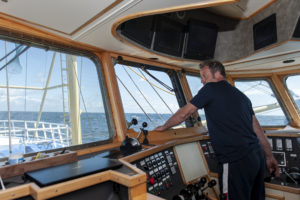
Skipper Neil Pearce surveys the surrounding waters from the wheelhouse, as the benign skies overhead are gradually replaced by a weather front bringing deep pockets of swell.
Skipper Neil Pearce is 51, and has been fishing for 36 years, since the age of just 15. “I went to work with my dad a few times as a carpenter, but never got on. So I got a job with YTS – my first boat was the Magdalena, at £27.50 a week. I was meant to get £10 off each of the crew, but only two of them paid me.
“Then I had a job offer on the Niblet, so I left the Magdalena when I was 17, worked there for five years, and then went with Mike on the Lady T – it was Mike and Graham Perkes then – and I’ve been with Mike ever since.”
This quite possibly makes Neil the longest-serving skipper working with a Brixham owner. “I’ve been married 25 years, and Mike came to my wedding! Nearly 30 years I’ve stayed with Mike.”
Garry Roberts, or Taff as he was more commonly known, was the mate onboard. “I’ve been fishing for 30-odd years,” Taff said. “Started when I was 13 on the angling boats in Rhyl – they did shrimping trips in the winter, angling trips in the summer, bit of netting, bit of trawling – and me old man said: ‘Look, if you are going to be a fisherman, head off to Fleetwood and do it, a proper fishing port, like.
“Did that, ended up in Fleetwood College, then did a YTS course, and joined a Brixham beamer. Never left since.”
As I stepped onboard the Mollie Jayne, I saw a familiar face on deck – Roger Winsborrow, 40 years a fisherman, who had been on the first Waterdance vessel I did a trip on, the Margaret of Ladram, five years earlier. In July, he told me, he would be turning 57, with his wife and son also having birthdays across a nine-day period – when, he assured me, he had no plans to be at sea!
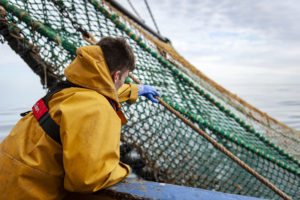
Jay Jay reaches across and prepares to secure the raised net.
The other deckhand, John James Fenton, or Jay Jay to most, was a 33-year-old fisherman with almost 13 years under his belt. He was actually from another of Mike Sharp’s beamers, the Emilia Jayne, filling in for the Latvian Uldis, currently enjoying a well-earned break in his native country, and another blast from my seagoing past, from my first-ever week at sea. That was on the Emily Rose – another of Mike Sharp’s vessels, skippered at the time by old seadog Arthur Dewhirst. I had pretty much come full circle.
Within minutes of getting onboard, Neil had given me one of the most thorough inductions to a fishing vessel I had ever heard – from the muster point to the various fire extinguisher locations, the lifeboat locations, and even how to use the VHF radio and DCS in an emergency.
After we departed Brixham and with fishing operations soon underway, I was introduced to the ‘fifth man’ of the team – a Van Rijn conveyor and fish washer, completely different in shape and implementation to anything I’d seen before, with three compartments to store and meticulously clean the fish, and levers to pull when the contents were ready to be conveyed to the fishroom. This was next generation.
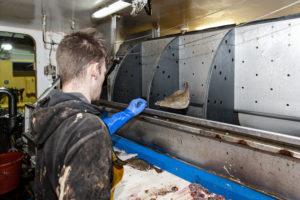
Another plaice goes into Mollie Jayne’s ‘next-gen’ fish washer, which aerates the water to keep the fish in prime condition.
Taff explained: “It’s not a conventional fish washer, that just squirts water in – it does it with air as well, to make a bubbly effect. Our fish is meant to be pristine, the best quality, like – people are paying a little bit more for our fish, for how well it is looked after. You can overwash fish, and it looks horrible.”
Neil added: “A fan blows air, and that aerates the water, makes a lot of bubbles, similar to a jacuzzi – and the fish go around slowly, so it’s not damaging them.”
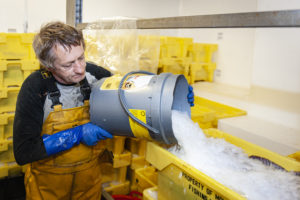
Down in the fishroom, Roger covers the next box with flake ice.
While Brixham baked under a clear blue sky as we set out at the end of June, the forecast for the week ahead was a mixture of swirling winds and imposing swells, with each day amplifying those easterly numbers. The following Monday was forecast to be the only stand-out day – but this good-weather window was sandwiched between an ever present mass of movement.
There was another, far more concerning, storm to contend with, and this showed no signs of dissipating. The Russian invasion of Ukraine was now four months in. The cost of living had escalated to such levels that it had become scary just to fill up your car, and while my little Dacia Sandero had now hit over £90 for a full tank, this was dwarfed by the cost implications for a fishing vessel, its owner and its crew. The Mollie Jayne had a fuel capacity of approximately 21,200 litres, and prices per litre were now nudging £1.10.
“This is me fifth trip. I’ve come off the day haulers,” Taff told me. “Wilf, the relief skipper, he’s been asking me to come on here for months – and then the price hike kicked in. This time of year is not brilliant for day haulers – it’s five, six, seven hundred pound a week – but the fuel hike cost me £250 a week out of my wages to carry on day-hauling, and on that I can’t live, so that made me mind up to come back beaming. I’ve been beaming for 15 years, day hauling for 15 years – and now I’ve come back beaming.”
The cost of fuel was a constant theme through the eight-day trip, with Neil and Taff working to make fishing operations as cost-effective as possible, as the weather continued to hound the many vessels in the area. As Neil took his six hours down below, Taff explained: “It’s like now – we can’t stay on the ground where we want to fish, because we will be going against the wind and tide. If fuel was cheaper, and there was a decent bit of fish, you’d burn more fuel, you’d chase the fish. But now we are just going with the tide one way, six hours, then back the other way.
“We’ve got an easterly tide now, so I’m going easterly, so that’s why the revs are down to 1,300, whereas normally we’d be going north or south, going along the stem of the tide a bit more – but you’d be burning more fuel. It’s fuel first now, then fishing – whereas before it was fishing, then fuel – you didn’t really think of the fuel.
“If you wanted to go there,” Taff pointed to 10 o’clock portside, “you wouldn’t have thought: ‘I’ll have to wait six hours to get back there.’ It’s like Neil, last night, he had a good haul – a basket of sole, a basket of monk, a basket of flat – and he couldn’t go back there, because of the tide.”
Neil echoed this during his late-evening shift. “The tide is coming this way now, so I’ve angled the boat to use a bit of the tide so I can slow down a bit, to use a little less revs. We’ve got cruise control, so I’ve set it at 3.5 knots and it will try and keep it to that, instead of me slowing it down, jumping it up, giving it loads of power – then it goes to four and a half knots, so it’s just excessive fuel you are using all the time. This just builds up slowly and brings it down slowly, so you are not using too much.
“You’ve got to be really conservative – it’s all about fuel – well, 90% about fuel. You’ve got to be on some good fish to warrant using loads of fuel to stay on your ground.”
There were other ways of economising, but it was always a balancing act, Taff explained. “You could use lighter gear, but then it will start to affect your fishing. Lighter gear means you won’t catch as much fish, because you won’t have as much ground contact. We have 8m gear. You could use shorter gear, you could use lighter gear, but you’ll lose out on more fish. It’s Catch 22.”
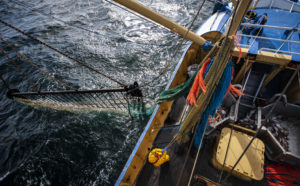
As fishing continues, Roger heaves the codend tight, ready to go back into the Channel.
“We’ve gone to bigger mesh now,” Neil added, “to make it a bit easier to tow, gone to one-fifty bellies, with less drag, so there’s maybe a few scallops or a bit of squid gone, and we’ve got 100mm codends on. It just basically trawls a bit easier – the bigger the diameter of the mesh, the less water resistance there is. Small meshes are going to create a lot of drag.”
Taff didn’t see the fuel crisis ending any time soon. “This is the new normal, I think. Me and Neil were talking about it before, and he said if it dropped down to 80p we’d be all right. 80p is still ridiculous! If you’re burning 13,000, 14,000 litres per week, it’s 10 grand straight away before anything. Ten grand! That’s without your commission, your harbour dues, your grub, your box washing, your standing charge which you’ve got to pay for your gear, and everything else.”
Was there a breaking point? “I reckon when it hits £1.20, you’re going to have a lot more boats tying up. Or you’ll do a week, and then say, if the next week is big tides or the weather’s not too good, we ain’t going. But there are still a lot of bills to pay for the boat. And where is the breaking point for the crews? They’ll be thinking, why am I getting battered out there for £300, £400 a week – you could get a shore job for that, no problem. Go labouring for £100 a day!”
“It’s fuel first now, then fishing – whereas before it was fishing, then fuel – you didn’t really think of the fuel”
This was already happening over in Holland and Belgium, with a number of Dutch vessels remaining in harbour, while protests were also taking place in ports including Ijmuiden and Harlingen, with entry to Lauwersoog blocked by fishing vessels on the night of 5 July. With French fishermen now receiving fuel compensation, why were the governments of neighbouring countries turning a blind eye to this pressing need for help?
“If this was farmers, we’d have subsidises now, we definitely would,” Taff said, “but the politicians and the government don’t care about the British fishing industry, because there is so much exporting in our industry. We are not a fish-eating country, are we? – and I don’t know why not, because it’s the best fish you can get!
“But the government aren’t bothered. It’s like with the steel industry, the coal industry; the fish industry will be the next one down the pan. No up and coming fishermen – I think we’re a dying breed.”
After days of being forced around by the swell, the Monday did in fact turn out glorious. As Neil took his morning six hours in the wheelhouse, he relayed the fixed fuel price for the week ahead. The cost had decreased by a few pence – nothing game-changing, but every little certainly helped.
“It’s worrying times,” Neil said. “It’s not only us it affects, you’ve got to think about all the workers in the markets, the store men, the secretaries… and if the boats are in harbour, the welders, the fabricators, the steel workers – if the boats are tied up, they are not going to get any jobs done. It is going to affect a lot of people if it goes up to a ridiculous amount.
“It’s not just…” Neil paused momentarily, clearly feeling the weight of all this and more. “It’s everybody – it’s the whole of the United Kingdom struggling at the moment. If every fishing boat was to tie up around England, just think how many families and businesses that would crucify. Brixham would be a ghost town. You’d see people losing houses. It’s worrying times. I never thought it would come to this, I really didn’t.
“Fish prices are brilliant at the moment, they are really good, I’ll take my hat off to that – but it’s just a lot of pressure. You’ve got to go to sea, and you can’t afford a bum trip. If the crew only pick up three or four hundred quid, do you think they are going to come back next week? When you can sit at home and sign on, or get a job stacking shelves, for that money? It’s not sustainable for us – it can’t be.”
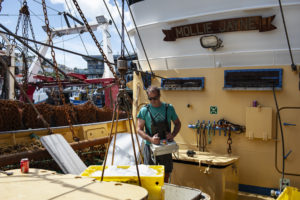
Back ashore, the weather is a far cry from that battering the Channel, as Neil works the winch controls to lift fish boxes onto the dock.
After the Mollie had landed and I returned home, I called Mike Sharp one last time on 11 July to get a heads-up on another weekly fuel price. The news was slightly better than I anticipated. “The fuel has come to 95p this morning, so that’s come down from £1.09.” Was there any particular reason for this week’s change, I asked? “I haven’t got a clue. It really needs to come down into the sixties, seventies, to make it viable again, because at the moment it’s just treading water, really.
“I’ve gone from the three boats at, what, £60,000 a month, to £120,000, and there’s just nothing left. And if anything major goes wrong, it’s going to be a real struggle, so hopefully it will come down a little bit and it will be manageable. And then, hopefully, October time the cuttlefish will start, and that should ease it a little bit – that should increase our landings a little bit more.
“We land on the market on a clock, so I can’t pass the costs on, like a builder or whoever could pass the extra costs on. A taxi driver can go: ‘The fuel’s gone up, so the fare’s gone up so much’ – but we just can’t do that. We are the end of the line.
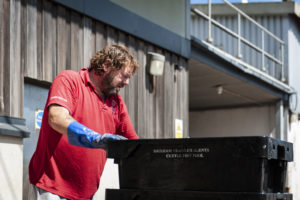
Taff is on hand to help land the Mollie Jayne’s catch and position the boxes ready for the forklift.
“Luckily the prices have been really, really good, partly because the Dutch fleet have been tied up because of the fuel – a lot of them, and that’s what brought the price of the fish up in the UK.
“The French, I hear, are getting 35p a litre off. I don’t know – something’s got to break or change.”
What that could be, or even when, is anyone’s guess. With the PM’s resignation and the usual swarm vying for the top spot, the plight of UK fishermen will likely now be sidelined up to – and probably beyond – whatever conclusion there is in the race for a new PM. Mike said: “We had Sky TV going to come down last Wednesday, wanting an interview about the fuel, and then we never heard from them again. The political world, Boris resigning, that’s what came first.”
This story was taken from the archives of Fishing News. For more up-to-date and in-depth reports on the UK and Irish commercial fishing sector, subscribe to Fishing News here or buy the latest single issue for just £3.30 here.



